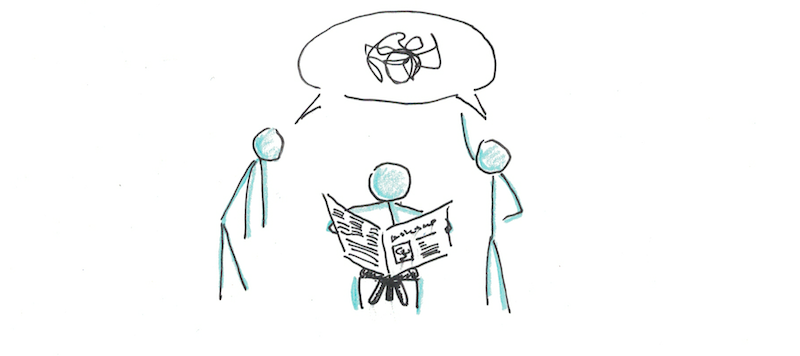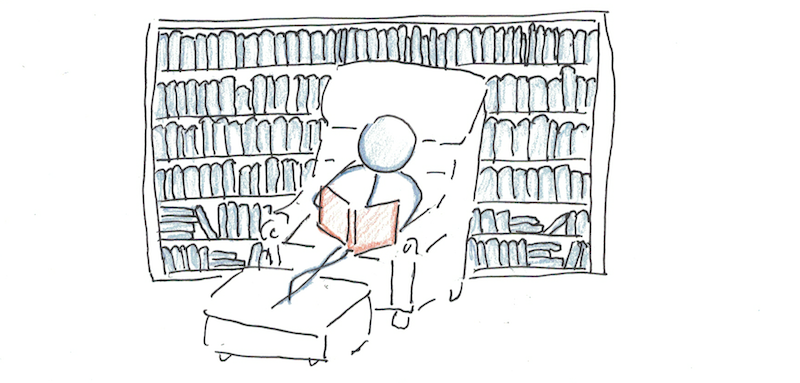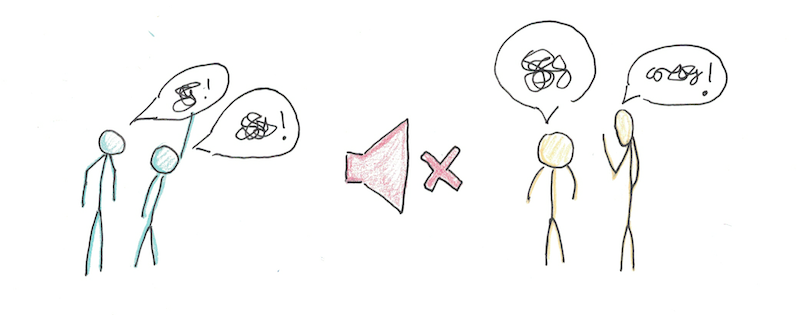When I was growing up, my family would watch the news every morning. The unquestioned belief was that this was a good thing to do. You should stay informed about what is happening, and news was the way to do this.
These days, I don’t have a cable subscription, so my news tends to come from social media. Twitter, Reddit, Facebook and blogs. The people I follow tend to talk a lot about news—politics, issues and current events.
Lately, I’ve been wondering whether that unquestioned belief of my childhood deserves more thought. Is following the news always a good things? Can you follow it too much?

What is Followed and What is Ignored
Whenever we talk about something being good or bad, the follow-up question must always be, “Compared to what?”
Eating potato chips all the time is bad. But the presumptive comparison there is a healthy diet. Certainly if you were starving to death, a bag of potato chips becomes a nutritious meal.
So too it is with the media we consume. Complete ignorance of what is going around you doesn’t seem to be very good. Total information starvation doesn’t seem like the right comparison. However, a lot of news and media may be more like potato chips than the healthy alternatives we ought to be consuming.
Downsides of Excessive News
The most obvious downside of excessive news is that much of it doesn’t matter all that much. Most things reported on in the news don’t have any suggested actionable consequences for the reader, and even when they do (say disaster relief or an upcoming election) the actionability of news is rarely most of the message.
Following politics, at least in democratic countries, is often seen as a civic duty. Failure to follow allows the bad guys to win elections, they say, and so failure to follow the latest twists and turns in the unfolding drama is a dereliction of that duty.
However, once again, the actions remain unclear. Elections are the major action points for political engagement, and yet they happen far less frequently than political news cycles persist.
Even if you believe political engagement is required of you, it’s not clear excessive news coverage helps. Too much news may be worse than too little, since the newness of news constantly pushes down important things. Instead of electing leaders based on well-deliberated policy opinions and patient judgements of character, the deluge of information washes away past judgements so it’s only the latest episode which stays salient.
How Much News is Ideal?
My feeling is that you should follow enough news to have a bare outline of what is going on, and you should have more information when that news should lead to decisions, but otherwise, your media diet shouldn’t focus on it.
In my perfect world, no more than 30% of my information consumption would be news. The remaining 70%+ would be spent on things that aren’t going to go stale with time. Ideas and theories which ought to be timeless.
Less News, More Olds
News focuses on what is happening now. But often what is happening now isn’t all that important. The ideas and actions that matter to your life are often unchanging. Principles, not fads. Policies, not politicians. Fundamental ideas, not ephemera.
I want to return to the question at the start, if you follow less news, what do you replace it with?
There are certainly less healthy sources of information to consume. Junk conspiracy theories, pseudoscience and ideological nonsense are all alternatives which are much worse than just following current events.
But, I suspect we can also do better. Acquire knowledge and skills which will remain valid months and years into the future.
Turning Down the Volume of Your Newsfeed
In the past, news was a program on television, a magazine or paper you purchased. Now, if you get your news online, it might be right alongside your other media. The aggregating and blurring of voices means you might follow a scientist on Twitter to hear about the latest in nutrition, but mostly get their opinions on momentary politics. How do you lower the volume of news when you no longer unilaterally control your input?
1. Read more books.

Books, due to delays in the publishing cycle, can’t be nearly as in-the-moment as your Facebook or Twitter feeds. They need to be written, edited, printed and sold, all of which takes months or years.
This bias away from recency means even if you’re going to read something pertaining to politics, governance or an event that recently happened, the quality of reporting and thinking will be higher than in purely online formats. You’re more likely to encounter deeper research and nuance, and so even if you don’t change the subjects you consume, you’ll get better information.
2. Mute the loudest.

I selectively unfollow people on Twitter or Facebook who post excessively about current events and news. A small fraction of the total input sources you have create the majority of noise, so even if you silenced ten percent, you’d have a much quieter feed.
3. Follow blogs (RSS still works!)

Blogging is still a powerful medium for getting information on a particular topic, which has enough barriers to publication that there is usually a modicum of editing and thinking before the writer hits “Post.”
Although RSS is a bit of an antiquated technology, it is still the best tool I’ve found. RSS isn’t algorithmically curated by large corporations, so you have full control over your feed, rather than being recommended the most inflamatory and sensational. Feedly continues to have the highest signal-to-noise ratio for me of any of the platforms I use, and I unsubscribe from blogs enough that it typically stays nearly empty.
Ultimately, however, a decision about what media to consume requires first deciding what would be ideal, and then having the discipline and planning to stick to that choice. News, while far from the worst, doesn’t seem to deserve the portion sizes it is often allotted.

 I'm a Wall Street Journal bestselling author, podcast host, computer programmer and an avid reader. Since 2006, I've published weekly essays on this website to help people like you learn and think better. My work has been featured in The New York Times, BBC, TEDx, Pocket, Business Insider and more. I don't promise I have all the answers, just a place to start.
I'm a Wall Street Journal bestselling author, podcast host, computer programmer and an avid reader. Since 2006, I've published weekly essays on this website to help people like you learn and think better. My work has been featured in The New York Times, BBC, TEDx, Pocket, Business Insider and more. I don't promise I have all the answers, just a place to start.